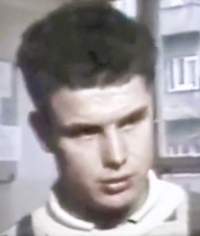We have decided to go on strike

Download image
Jindřich Šídlo was born on October 21, 1972 in Turnov, but grew up in Prague. He attended elementary school with extended language instruction, then continued at the Na Vítězné plani Gymnasium. He listened to the Voice of America radio station from the age of fourteen. In January 1989, he took part in a demonstration during Palach’s Week, and in the summer, he signed the Several Sentences petition. He also regularly visited Gallery H in Kostelec nad Černými lesy, which was run by his uncle, academic painter Zdenek Hůla. It was the centre of not only cultural but also social events. On November 17, he took part in a meeting in Albertov and continued with the procession to Vyšehrad, where he disbanded. Subsequently, he and his classmates from the gymnasium decided to participate in a student strike, refusing to enter the school building and learn. He also became a strike spokesman. In the 1990s, he studied journalism at the Faculty of Social Sciences of Charles University and worked for the magazine Respekt, where he focused mainly on the issue of racism. In 2022, he lived in Prague and worked as a journalist.
